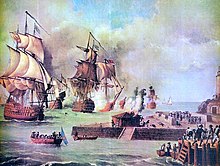Edward Boscawen
[2] He is also remembered as the officer who signed the warrant authorising the execution of Admiral John Byng in 1757, for failing to engage the enemy at the Battle of Minorca (1756).
[2] In his political role, he served as a Member of Parliament for Truro from 1742 until his death in 1761 although, due to almost constant naval employment, he seems not to have been particularly active.
The Honourable Edward Boscawen was born in Tregothnan, Cornwall, England, on 19 August 1711, the third son of Hugh Boscawen, 1st Viscount Falmouth (1680–1734)[3] by his wife Charlotte Godfrey (died 1754) elder daughter and co-heiress of Colonel Charles Godfrey, master of the jewel office by his wife Arabella Churchill, the King's mistress,[4]: 181 and sister of John Churchill, 1st Duke of Marlborough.
[4]: 182 The War of Jenkins' Ear proved to be Boscawen's first opportunity for action and when Shoreham was declared unfit for service he volunteered to accompany Vernon and the fleet sent to attack Porto Bello.
Vernon's achievement was hailed in Britain as an outstanding feat of arms and in the furore that surrounded the announcement the patriotic song "Rule, Britannia" was played for the first time.
[4]: 182 Large reinforcements had been sent from Britain, including 8,000 soldiers who were landed to attack the chain of fortresses surrounding the Spanish colonial city.
As a result of the battle Prime Minister Robert Walpole's government collapsed and George II removed his promise of support to the Austrians if the Prussians advanced into Silesia.
[7] For his services he was promoted in May 1742 to the rank of captain and appointed to command the 70-gun Prince Frederick to replace Lord Aubrey Beauclerk who had died during the siege.
The French under Admiral Rocquefeuil retreated and the British attempts to engage were confounded by a violent storm that swept the English Channel.
[4]: 186 With his flag in Namur, and with five other line of battle ships, a few smaller men of war, and a number of transports Boscawen sailed from England on 4 November 1747.
On the outward voyage Boscawen made an abortive attempt to capture Mauritius by surprise but was driven off by French forces.
Fortunately, for the Admiral and his staff, when a storm hit the British outpost Boscawen was ashore but his flagship Namur went down with over 600 men aboard.
A squadron of partially disarmed French ships of the line were dispatched to Canada loaded with reinforcements and Boscawen was ordered to intercept them.
The British squadron headed for Halifax to regroup but a fever spread through the ships and the Vice-admiral was forced to return to England.
The King made Boscawen a Privy Counsellor[26] in recognition for his continued service both as a member of the Board of Admiralty and commander-in-chief.
With his flag aboard the newly constructed HMS Namur of 90 guns he blockaded Toulon and kept the fleet of Admiral de le Clue-Sabran in port.
Having sustained damage in the action and due to the constant weathering of ships on blockade duty Boscawen took his fleet to Gibraltar to refit and resupply.
[4]: 208 The five French ships that avoided the battle made their way to Cadiz where Boscawen ordered Admiral Thomas Broderick to blockade the port.
Admiral Boscawen returned to sea for the final time and took his station off the west coast of France around Quiberon Bay.
After a violent attack of what was later diagnosed as Typhoid fever, the Admiral came ashore, where, on 10 January 1761, he died at his home in Hatchlands Park in Surrey.
[29] The monument at the church begins: William Pitt, 1st Earl of Chatham and Prime Minister once said to Boscawen: "When I apply to other Officers respecting any expedition I may chance to project, they always raise difficulties, you always find expedients.
[32] Boscawen was quoted as saying "To be sure I lose the fruits of the earth, but then, I am gathering the flowers of the Sea" (1756)[33] and "Never fire, my lads, till you see the whites of the Frenchmen's eyes.
"[34] In 1742 Boscawen married Frances Evelyn Glanville (1719–1805), with whom he had three sons and two daughters, and who became an important hostess of Bluestocking meetings after his death.








